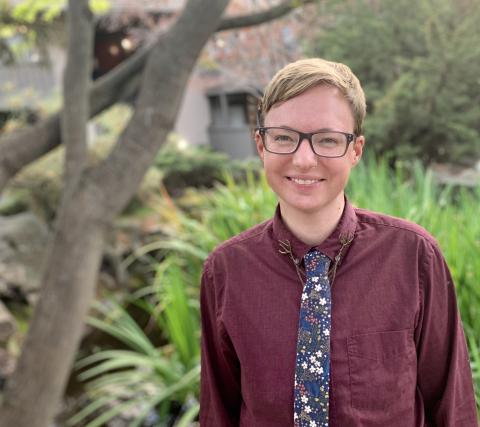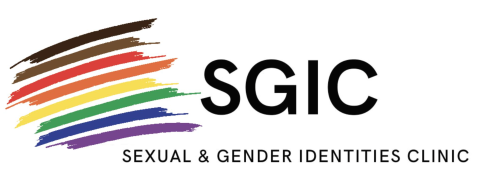
Sexual and Gender Identities Clinic Meets Community Need

The Sexual and Gender Identities Clinic (SGIC) offers affirming psychological services to lesbian, gay, bisexual, transgender, and queer (LGBTQ+) community members, at affordable, sliding scale rates. Just as importantly, the SGIC provides specialized training to Palo Alto University (PAU) doctoral students. Currently, seventeen student therapists carry a caseload of more than one hundred clients. The student therapists come from both the PhD in Clinical Psychology program and the PGSP-Stanford PsyD Consortium.
The SGIC was founded by Peter Goldblum, PhD, in 2009. Liz McConnell, PhD, has been the director of the SGIC since 2021, having joined the PAU faculty in 2019. Prior to coming to PAU, Dr. McConnell completed advanced training in working with LGBTQ+ populations through a research fellowship with the Institute for Sexual and Gender Minority Health and Wellbeing at Northwestern University as well as clinical training at the Center on Halsted (the largest LGBTQ+ community center in the Midwest) and several college counseling centers. Dr. McConnell provides administrative leadership to the Clinic as well as supervision to the student therapists.
“One thing I really appreciate about the SGIC is that while serving clients is a huge part of what we do, training is another huge part of what we do. It just fills my cup every day that our student therapists come into the SGIC wanting this training and knowing that it’s of need. After they leave, they go on to provide culturally responsive treatment in their other clinical practica, internships, and places they work throughout their careers. Students also tell us that other practitioners are almost immediately wanting to consult and draw on that expertise,” Dr. McConnell said.
Student therapists start with the SGIC after they’ve finished their first year of coursework, and for many this is their first formal practicum. They receive a general orientation to the Gronowski Center, PAU’s training clinic dedicated to providing counseling and psychotherapy services to people in Santa Clara and San Mateo counties. Then the student therapists attend an SGIC Intensive, which introduces them to foundational concepts in LGBTQ+ psychology.
Throughout the year, students engage in learning theory, research, and clinical skills specific to working with LGBTQ+ populations. In the fall term, they take an LGBTQ+ Issues in Psychology class with Kimberly Balsam, PhD, who leads the Center for LGBTQ+ Evidence Based Applied Research (CLEAR) and the LGBTQ+ Area of Emphasis at PAU. Students also continue to meet every term for an SGIC Intensive that covers a series of advanced topics. In addition to these SGIC-wide educational experiences, students receive weekly training through individual and small group supervision with an SGIC supervisor. Over the course of the year, students receive training in treatment planning and various evidence-based approaches, as well as how to adapt those approaches to working with LGBTQ+ people and communities.
Since the students spend one year with the SGIC, they continue training and meeting with clients throughout the spring term, but also begin to revisit their client’s goals and treatment plans at that time. In the spring and summer, clients may be referred to other mental health providers or continue with the SGIC when the next cohort begins.
Community members come to the SGIC for a variety of reasons. SGIC student therapists provide both individual and relationship therapy and work with a range of presenting concerns. Dr. McConnell broadly describes two types of clients:
“We have some clients whose primary concern isn’t their sexual or gender identity, but they want to make sure they’re seen in an affirmative environment. For another camp of clients, sexual or gender identity is a central part of what’s bringing them in. The most common pattern there is clients who are either questioning gender identity or going through a transition process.”
SGIC therapists take personalized, intersectional, client-centered approaches. About two-thirds of SGIC clients are Black, Indigenous, or People of Color (BIPOC), and therapists are encouraged to consider clients’ multiple intersecting identities throughout case conceptualization and treatment.
“We do a lot of multifaceted identity exploration and affirmation work,” Dr. McConnell said. “We work with some clients for whom experiences of racial discrimination are more pervasive and impactful than experiences of discrimination based on their gender or sexual identity. We also work with clients who have other cultural identities, or members of their family, or religious beliefs that are at odds with their sexual or gender identity. We have to listen, build trusting relationships, and be responsive to each client’s individual experiences.”
The pandemic has been a huge shift for the operations of the SGIC. The Gronowski Center quickly pivoted to telehealth in 2020. “Moving to telehealth with COVID has increased accessibility in multiple ways,” Dr. McConnell said. “We have been able to reach clients who might not have been able to access in person services because of lack of transportation, long working hours, or lack of LGBTQ+ affirmative services in their communities. During a time when so many people have felt isolated due to COVID, it has meant a lot to be able to offer that connection and accessibility.”
For some clients, working or attending school from home has allowed them to express their identity in a way they couldn’t previously. It has also allowed some to minimize contact with non-affirming environments, such as school or work, and to find new connections in online communities. But the pandemic has also kept people at home, some in non-affirming environments, or even prevented many from socializing and engaging in mental health-affirming activities.
The need for affordable, affirming mental health care, like that provided by SGIC, is stronger than ever, Dr. McConnell says. The cost of living in the Bay Area is high, which means many providers charge higher rates and may not even accept insurance. Significant segments of the LGBTQ+ community are economically disenfranchised, putting therapy out of reach for many.
As one of the few LGBTQ+ resources in the Peninsula, the SGIC fulfills a significant need in Santa Clara and San Mateo counties, increasingly accepting more than one hundred clients per year. The work of the Clinic expands beyond that, though. The student therapists who are training in the Sexual and Gender Identities Clinic will have significant, specialized tools they carry into their careers and communities.
“Ultimately,” Dr. McConnell said, “we want to be in a world where every provider has this training and it’s not viewed as such a rarity.”

